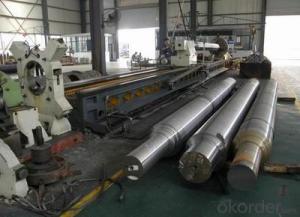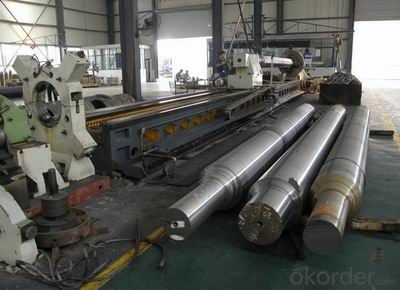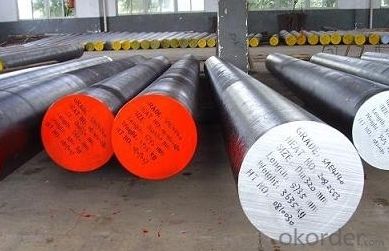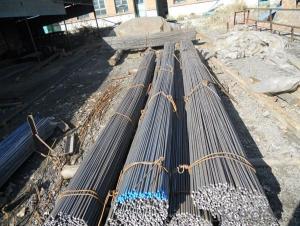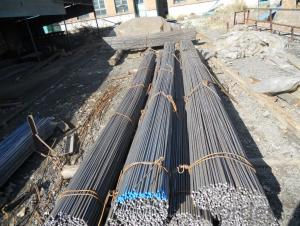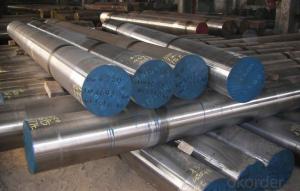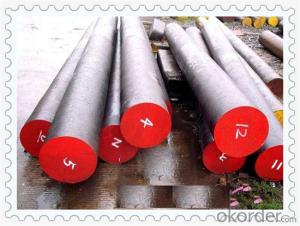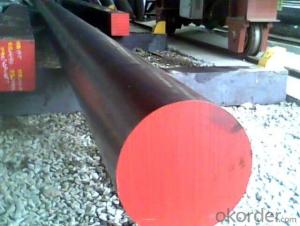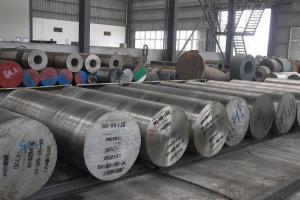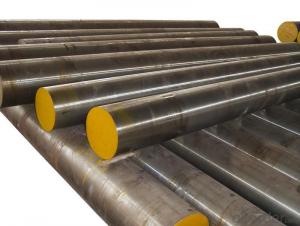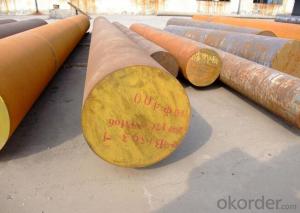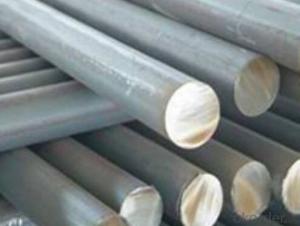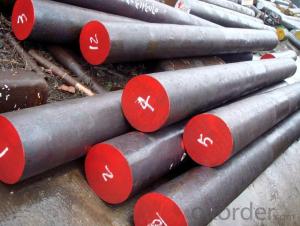42CrMo China Standard Forged Steel Round Bar
- Loading Port:
- Shanghai
- Payment Terms:
- TT or LC
- Min Order Qty:
- 25 m.t.
- Supply Capability:
- 10000 m.t./month
OKorder Service Pledge
OKorder Financial Service
You Might Also Like
Product Description:
OKorder is offering Round Bar at great prices with worldwide shipping. Our supplier is a world-class manufacturer of steel, with our products utilized the world over. OKorder annually supplies products to European, North American and Asian markets. We provide quotations within 24 hours of receiving an inquiry and guarantee competitive prices.
Product Applications:
1) Suitable for making various strong cutting tool abrasion resistance, impact resistance.
2) Used to produce all kinds of high hard and super hard saw blade, drill, tap, broach, gear hob and various kinds of milling cutter.
3) Used for advanced punching die, screw die, and the toughness and complicated shape of the punch, etc.
Product Advantages:
OKorder's Round Bar are durable, strong, and resist corrosion.
Main Product Features:
· Premium quality
· Prompt delivery & seaworthy packing (30 days after receiving deposit)
· Corrosion resistance
· Can be recycled and reused
· Mill test certification
· Professional Service
· Competitive pricing
Product Specifications:
Diameter | Mass | Diameter | Mass | Diameter | Mass |
(mm) | (kg/m) | (mm) | (kg/m) | (mm) | (kg/m) |
6 | 0.22 | 22 | 2.98 | 53 | 17.30 |
7 | 0.30 | 24 | 3.55 | 56 | 19.30 |
8 | 0.40 | 25 | 3.85 | 60 | 22.20 |
9 | 0.50 | 26 | 4.17 | 63 | 24.50 |
10 | 0.62 | 28 | 4.83 | 65 | 26.00 |
11 | 0.75 | 30 | 5.55 | 70 | 30.20 |
12 | 0.89 | 32 | 6.31 | 75 | 34.70 |
13 | 1.04 | 34 | 7.13 | 80 | 39.50 |
14 | 1.21 | 36 | 7.99 | 85 | 44.50 |
15 | 1.39 | 38 | 8.90 | 90 | 49.90 |
16 | 1.58 | 40 | 9.86 | 95 | 55.60 |
17 | 1.78 | 42 | 10.90 | 100 | 61.70 |
18 | 2.00 | 45 | 12.50 | 120 | 88.85 |
19 | 2.23 | 48 | 14.20 | 140 | 120.93 |
20 | 2.47 | 50 | 15.40 | 150 | 138.82 |
FAQ:
Q1: Why buy Materials & Equipment from OKorder.com?
A1: All products offered byOKorder.com are carefully selected from China's most reliable manufacturing enterprises. Through its ISO certifications, OKorder.com adheres to the highest standards and a commitment to supply chain safety and customer satisfaction.
Q2: How do we guarantee the quality of our products?
A2: We have established an advanced quality management system which conducts strict quality tests at every step, from raw materials to the final product. At the same time, we provide extensive follow-up service assurances as required.
Q3: How soon can we receive the product after purchase?
A3: Within three days of placing an order, we will begin production. The specific shipping date is dependent upon international and government factors, but is typically 7 to 10 workdays.
Images:
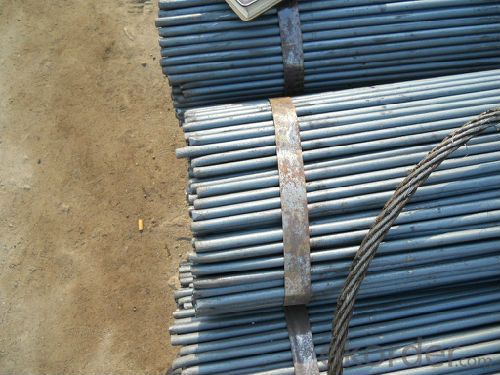
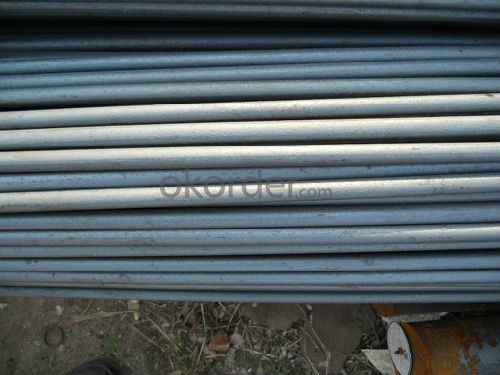
- Q: What are the different types of steel round bar alloys for improved machinability and strength?
- There are several different types of steel round bar alloys that are specifically designed to offer improved machinability and strength. These alloys are commonly used in various industries where the ability to machine components efficiently while maintaining high tensile strength is crucial. Some of the most popular steel round bar alloys for improved machinability and strength include: 1. 12L14: This alloy contains lead, which acts as a lubricant during machining, resulting in improved chip formation and reduced tool wear. It offers excellent machinability and good strength, making it suitable for applications that require intricate machining processes. 2. 4140: Also known as "chromoly" steel, this alloy contains chromium and molybdenum, which enhance its strength and hardenability. 4140 steel round bars are widely used in applications that require high tensile strength, such as automotive parts, shafts, and gears. 3. 8620: This alloy is a low-alloy nickel-chromium-molybdenum steel that offers a combination of high strength and good toughness. It can be easily machined and is often used in applications that require case-hardening, such as gears, shafts, and fasteners. 4. 1018: Known as "cold-rolled" or "cold-finished" steel, 1018 is a low-carbon steel alloy that offers good machinability and weldability. It is commonly used in applications where precise and smooth finishes are required, such as in the manufacturing of bolts, screws, and hydraulic fittings. 5. 52100: This alloy is a high carbon, chromium-bearing steel that is primarily used in the manufacturing of bearings and other high-wear applications. It offers excellent hardness, wear resistance, and machinability, making it suitable for components that require high strength and durability. These are just a few examples of the different types of steel round bar alloys available for improved machinability and strength. The choice of alloy depends on the specific requirements of the application, such as the desired strength, machinability, and durability. Consulting with a materials engineer or supplier can help determine the most suitable alloy for a particular use case.
- Q: Is round steel bar round steel?
- Yes.From the shape of points for the light round steel, crescent steel, rebar.From the strength of reinforcement is divided into one level (235), two (335), three (435), four (435)Cold drawn from the production process (first tensioning and long pull method), cold and so on
- Q: What are the advantages of using nickel-molybdenum-vanadium alloy steel round bars?
- There are several advantages of using nickel-molybdenum-vanadium alloy steel round bars, including: 1. High strength and durability: Nickel-molybdenum-vanadium alloy steel round bars offer excellent strength and durability, making them suitable for applications that require a high level of structural integrity. This alloy steel is known for its ability to withstand heavy loads and resist deformation, making it ideal for use in industries such as construction, automotive, and aerospace. 2. Corrosion resistance: Another advantage of using nickel-molybdenum-vanadium alloy steel round bars is their excellent resistance to corrosion. The addition of nickel and vanadium to the alloy enhances its ability to resist oxidation and corrosion, even in harsh environmental conditions. This makes it a preferred choice for applications where exposure to moisture, chemicals, or corrosive substances is expected. 3. Heat resistance: Nickel-molybdenum-vanadium alloy steel round bars have a high heat resistance, making them suitable for applications that involve high temperatures. The presence of molybdenum in the alloy increases its resistance to thermal stress, ensuring that it remains structurally stable even at elevated temperatures. This makes it ideal for use in industries such as oil and gas, power generation, and heat exchangers. 4. Versatility: The versatility of nickel-molybdenum-vanadium alloy steel round bars is another advantage. This alloy can be easily forged, machined, and welded, allowing for a wide range of manufacturing processes. Its versatility makes it a preferred choice for applications that require complex shapes and designs, such as shafts, gears, and valves. 5. Cost-effective: Despite its numerous advantages, nickel-molybdenum-vanadium alloy steel round bars are relatively cost-effective compared to other high-performance alloys. Its excellent combination of properties makes it a cost-efficient option for various industries, as it offers a longer lifespan, reduced maintenance requirements, and improved performance, ultimately resulting in cost savings over time. In conclusion, the advantages of using nickel-molybdenum-vanadium alloy steel round bars include high strength and durability, corrosion resistance, heat resistance, versatility, and cost-effectiveness. These properties make it a preferred choice for a wide range of applications in various industries.
- Q: What are the different types of steel round bar heat treatments?
- Steel round bars can undergo several types of heat treatments, each aiming to enhance specific material properties. Common heat treatments include annealing, normalizing, quenching and tempering, and case hardening. 1. Annealing involves heating the steel round bar to a high temperature and gradually cooling it to room temperature. This process relieves internal stresses, improves machinability, and enhances ductility and toughness. 2. Normalizing, similar to annealing, requires heating the steel round bar to a specific temperature. However, instead of slow cooling, the bar is left to cool in air. Normalizing refines the grain structure, improves mechanical properties, and enhances machinability. 3. Quenching and tempering entails heating the steel round bar to a high temperature and rapidly cooling it using a quenching medium like oil or water. This rapid cooling achieves high hardness and strength. Subsequently, the steel is tempered by reheating it to a lower temperature, enhancing toughness and reducing brittleness. 4. Case hardening is employed to increase the surface hardness of the steel round bar while maintaining a tough core. This treatment involves heating the bar in the presence of carbon-rich substances like gas or liquid carburizing agents. It results in a hardened outer layer, known as the case, while the core remains relatively softer and more ductile. These examples demonstrate the various heat treatments applicable to steel round bars. The choice of heat treatment depends on the desired properties and applications of the steel. Consulting with metallurgical experts ensures the selection of the most appropriate treatment for each specific steel round bar.
- Q: Can steel round bars be used for making bearings?
- Steel round bars can indeed be used for making bearings. However, it is important to note that the specific type of steel used, as well as the manufacturing process, play a crucial role in determining the suitability of steel round bars for bearing applications. Bearings are typically subjected to high loads and require good wear resistance, low friction, and high durability. Steel round bars made from high-quality alloy steels, such as chrome steel or stainless steel, are commonly used for bearing manufacturing due to their excellent mechanical properties. These steel round bars undergo specific heat treatment processes, such as quenching and tempering, to enhance their hardness, strength, and wear resistance. Additionally, the round bars are typically machined to precise tolerances to ensure proper fit and alignment within the bearing assembly. It is important to consult with materials and manufacturing experts or refer to industry standards to ensure the appropriate steel round bar material and manufacturing processes are used for bearing applications. This will ensure the best performance, reliability, and longevity of the bearings in various operating conditions.
- Q: Can steel round bars be hardened or tempered?
- Yes, steel round bars can be hardened or tempered.
- Q: What are the different safety considerations when working with steel round bars?
- When working with steel round bars, there are several safety considerations to keep in mind. First and foremost, it is important to wear appropriate personal protective equipment (PPE) such as safety glasses, gloves, and steel-toed boots to protect against potential hazards. Additionally, one should always handle the steel bars with care to avoid injuries from sharp edges or heavy lifting. It is crucial to ensure a secure and stable work area to prevent slips, trips, and falls. Furthermore, when using tools or machinery to cut or shape the steel bars, proper training and caution should be exercised to prevent accidents and follow all recommended safety procedures.
- Q: What is the tolerance level for steel round bars?
- The tolerance level for steel round bars can vary depending on the specific industry standards and requirements, but commonly, it falls within a range of +/- a few millimeters or less.
- Q: Can steel round bars be anodized?
- No, steel round bars cannot be anodized because anodizing is a process that is specifically designed for aluminum and its alloys. Anodizing involves creating an oxide layer on the surface of the metal, which provides enhanced corrosion resistance and can also be used for decorative purposes. Steel, on the other hand, does not form a stable oxide layer like aluminum, and therefore cannot be anodized in the same way. However, there are other surface treatment options available for steel, such as galvanizing or powder coating, which can provide similar benefits.
- Q: How are steel round bars used in the manufacturing of agricultural machinery?
- Steel round bars are commonly used in the manufacturing of agricultural machinery as they provide strength, durability, and flexibility. These bars are often used to construct various components such as axles, shafts, and pins, which play a crucial role in supporting and transmitting power within the machinery. The high tensile strength of steel round bars allows them to handle heavy loads and withstand harsh operating conditions, ensuring the reliability and longevity of the agricultural equipment.
Send your message to us
42CrMo China Standard Forged Steel Round Bar
- Loading Port:
- Shanghai
- Payment Terms:
- TT or LC
- Min Order Qty:
- 25 m.t.
- Supply Capability:
- 10000 m.t./month
OKorder Service Pledge
OKorder Financial Service
Similar products
Hot products
Hot Searches
Related keywords
